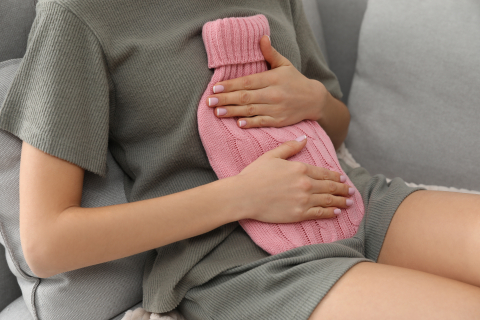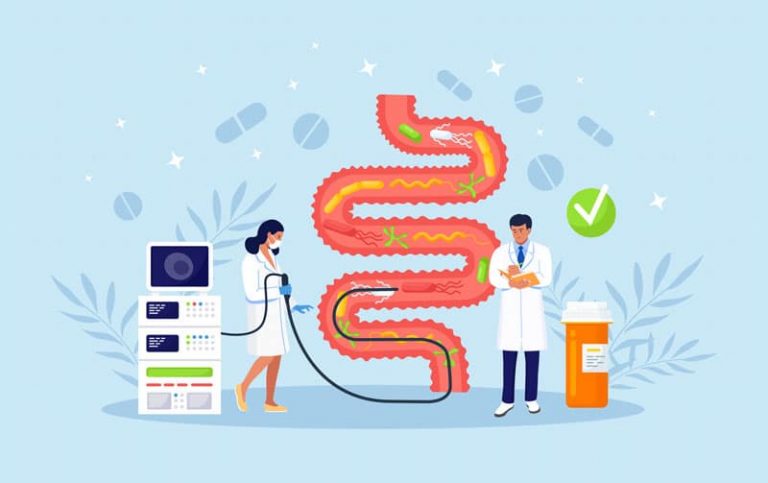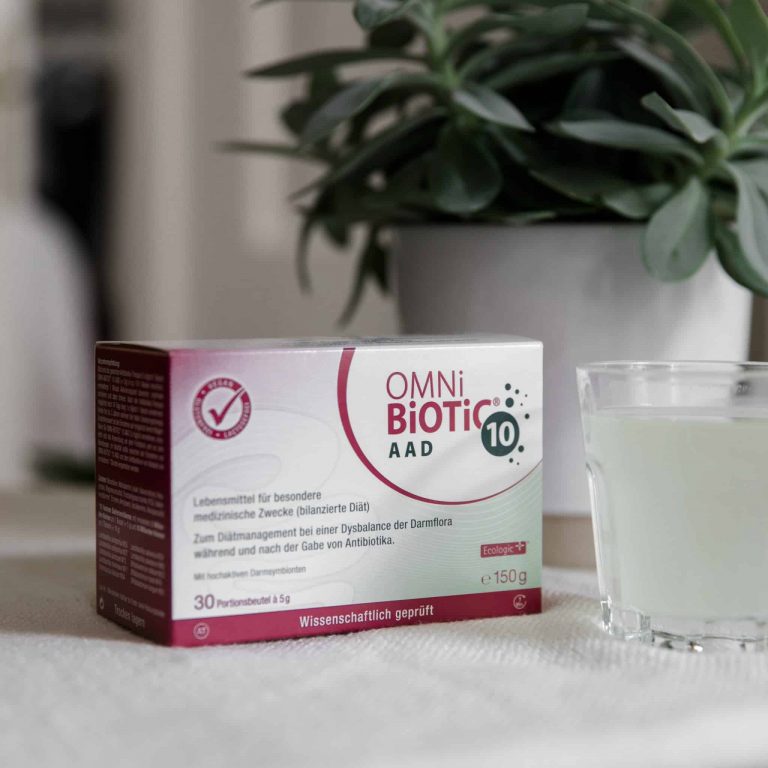Irritable Bowel Syndrome (IBS)
Irritable bowel syndrome causes symptoms in the gastrointestinal area – but without organic causes. It is a functional disorder of the digestive system.
Contents
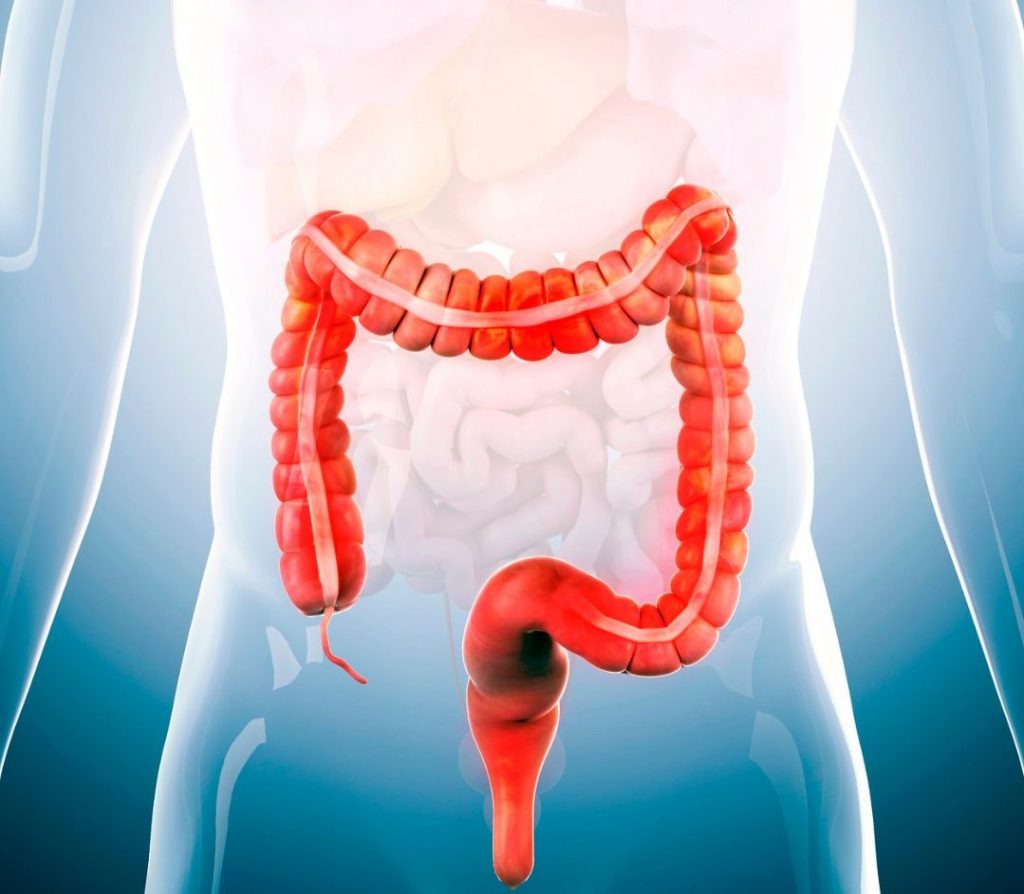
What is irritable bowel syndrome (IBS)?
Irritable bowel syndrome (IBS) is one of the most common functional disorders of the gastrointestinal tract. Not only the colon is affected, but the whole digestive system is affected. Despite thorough medical examination, no organic cause can be found for the often severe digestive complaints.
It is estimated that about 20 % of the population in industrialised countries suffer from irritable bowel syndrome to a greater or lesser degree. Women are affected about twice as often as men. The symptoms usually appear for the first time between the ages of 20 and 30 and often last for months or years. Often, the use of antibiotics in connection with an intestinal infection can also be identified as a trigger (the so-called post-infectious irritable bowel syndrome). The patients’ quality of life is often considerably reduced.
What symptoms does IBS cause?
Typical symptoms of irritable bowel syndrome are abdominal pain, cramps in the abdomen, flatulence and constipation and/or diarrhoea. Stress additionally aggravates the symptoms. The complaints sometimes disappear after a bowel movement or occur more frequently after eating, especially if too much has been eaten. Then it may be that the digestive enzymes are not sufficient, which in turn triggers flatulence.
Sometimes you may have a feeling as if the bowels cannot be emptied properly. Heartburn, belching and bowel sounds may also occur. Only after other serious organic diseases have been ruled out (other causes for the complaints must be excluded) may or can the diagnosis “irritable bowel syndrome” be made. The condition itself is very distressing, but not dangerous.

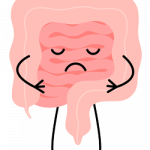
IBS Symptoms
The disease of irritable bowel syndrome (IBS) is present when the following 3 points are fulfilled:
- There are chronic complaints, i.e. lasting longer than 3 months (e.g. abdominal pain, flatulence), which are referred to the intestine by the patient and the doctor and are usually accompanied by changes in bowel movements (diarrhoea, constipation or alternation between diarrhoea and constipation).
- The complaints are the reason why the patient seeks help and/or worries a lot about it and the symptoms must be so severe that the quality of life is relevantly affected by it.
- The prerequisite is that there are no changes characteristic of other health conditions.
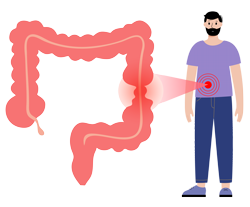
Other Symptoms
Patients suffering from irritable bowel syndrome often also have the following problems or complaints:
- Anxiety disorders
- Depression
- Insomnia
- Chronic fatigue syndrome (CFS)
- Headaches (migraines)
- Fibromyalgia (so-called “soft tissue rheumatism” with diffuse pain symptoms)
- Menstrual cramps
Living with IBS
After the diagnosis of IBS, there are some things you should watch out for or even avoid. It is important to listen to your body and recognise which foods are good for it and which cause discomfort. Find some ways to deal with the symptoms – this way, outings and normal everyday life will be fun again and not a burden.
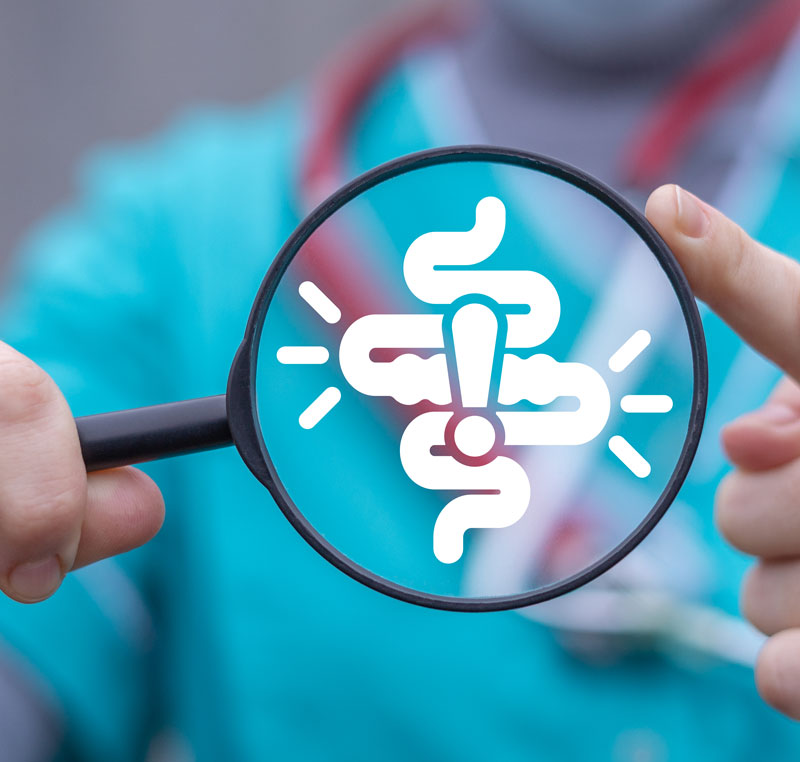
Causes of IBS
There are various theories about the medical-scientific causes of IBS. Among other things, bacterial infections of the stomach and intestinal tract, a disturbance of the immune function in the area of the digestive system and abnormal intestinal peristalsis (motility disorder) are assumed to be the triggers of IBS. Scientists have been able to identify a whole series of typical changes in the intestines of those affected. However, these changes do not only occur in irritable bowel syndrome, but also in chronic inflammatory bowel diseases, diverticulitis and food intolerances.
In people with irritable bowel syndrome, food passes through the digestive tract too quickly or too slowly. Affected people can therefore suffer from diarrhoea (passage time too fast, so that no fluid reabsorption can take place, the stool remains thin) or constipation (passage too slow). Often there is a miscolonisation of the intestine (the normal intestinal bacteria that help with digestion are in the minority, harmful, gas-forming bacteria gain the upper hand), more intestinal gas is formed, which leads to bloating, flatulence and severe abdominal pain. In addition, the sensitivity to pain is increased in irritable bowel patients due to, among other things, a lowered pain threshold to stretching stimuli. The intestinal barrier protecting against harmful substances is weakened, the intestinal wall becomes more permeable (“leaky gut“): no adequate removal of harmful substances takes place. Stress aggravates the symptoms. Patients with irritable bowel syndrome have an increased susceptibility to depression and anxiety disorders. A dysfunction of the autonomic nervous system together with psychosomatic disorders is also discussed.
Other causes of IBS
The neurotransmitter serotonin is also responsible for how pain is perceived. If the nervous system of the intestine is stimulated in irritable bowel syndrome, it can no longer properly regulate how many messenger substances are released. Therefore, it can happen that those affected perceive their intestines more strongly and feel pain, while in “healthy” people these stimuli do not exceed the perception threshold.
The intestinal wall of irritable bowel patients reacts particularly sensitively to stretching stimuli from food. The intestine has its own nervous system in the intestinal wall (the enteric nervous system = ENS), which is also called the “abdominal brain“. It signals when food enters the intestine and stretches the wall. Together with the neurotransmitter “serotonin”, the ENS controls digestion by stimulating the intestinal muscles to alternately contract and relax, creating a peristaltic wave and transporting the food forward. In irritable bowel syndrome, this intestinal nervous system is disturbed, “irritated”, it gives faulty instructions to the intestinal muscles. This results in unsynchronised intestinal movements, which also impairs digestion as a whole. Either the food pulp is transported too quickly – diarrhoea develops (irritable bowel syndrome of the diarrhoea type). The opposite is also possible: if the muscles move too slowly, constipation can develop (constipation-type irritable bowel syndrome). Irritable bowel cramps and flatulence occur when the muscles contract too much and no longer relax completely.
Several studies show that irritable bowel syndrome can be the result of gastrointestinal infections (“stomach flu”). It is possible that intestinal infections with certain bacteria (such as Campylobacter jejuni, Clostridum difficile, harmful E.coli) are more likely to trigger irritable bowel syndrome than other pathogens. An enteric (= affecting the intestine) infection is responsible for only one in ten cases. When an intestinal infection is the cause of irritable bowel syndrome, people typically develop pronounced diarrhoea symptoms. Antibiotics – often used prematurely for intestinal infections – also cause damage to the intestinal biotope and can be the trigger for irritable bowel syndrome.
Increased immune activity can be detected in tissue samples of the intestinal mucosa of affected people. Thus, increased defence cells of the immune system and their messenger substances (inflammatory mediators such as interleukins) are detected in the mucosa. Where this increased activity in irritable bowel syndrome comes from and what it possibly serves is still being researched.
In the intestinal mucosa, neighbouring cells are each connected to each other via a “tight junctions“. They seal the cells against each other so that no foreign substances or pathogens can pass between the cells. As long as this “intestinal barrier” is intact, the entirety of the intestinal mucosal cells forms a protective shield, preventing foreign substances from entering the body from the intestinal space. In irritable bowel syndrome, this intestinal barrier is “leaky”, “holey”, the cells are no longer so firmly connected to each other, so that pathogens and toxins (“toxins”) can penetrate the intestinal mucosa more easily and lead to an immune reaction, to an “irritation”.
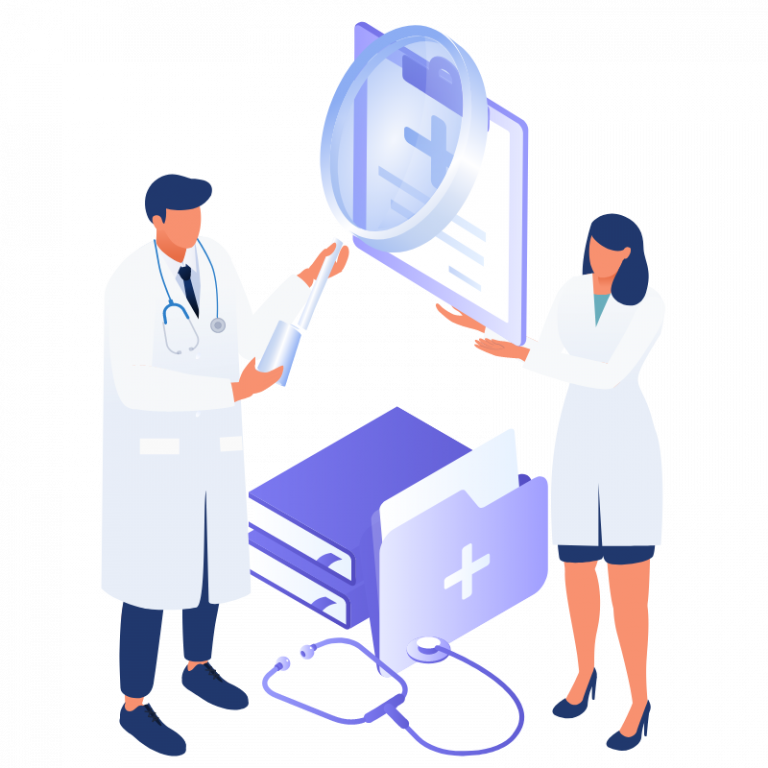
How is irritable bowel syndrome diagnosed?
The diagnosis of irritable bowel syndrome is made on the basis of the typical pattern of complaints and after ruling out other clinical pictures.
- Where do you have pain and in which situations does it occur?
- Do you have diarrhoea or constipation?
- Have you noticed a connection between the pain and certain foods or drinks?
- Do you have other symptoms such as vomiting, muscle and joint pain, heartburn and fever? Have you noticed blood in your stool? Do you feel tired quickly? Have you lost weight? This would be atypical for irritable bowel syndrome and is considered an alarm sign to look for serious illness.
- Do you have high stress levels?
- Do you have other illnesses? Ask about triggers and circumstances (e.g. stress, anger, overworking) that aggravate the symptoms.
- Do you regularly take medication or have you done so in the last few weeks (e.g. antibiotics, painkillers and heart medication, thyroid medication, laxatives)?
- Questions about family history (presence of diseases in the family)
- Presence of organic intestinal diseases (e.g. chronic inflammatory bowel disease (IBD) associated with severe diarrhoea)
Examinations to diagnose irritable bowel syndrome
After the detailed medical history discussion, a physical examination may take place during which the doctor looks at the anus and palpates and listens to the abdomen. A stool sample can provide information about digestive disorders and functional intestinal dysfunctions. The stool is also examined for hidden (occult = not visible) blood. In addition to the intestinal tract, the doctor also checks the bladder, the kidneys, in women the ovaries and, depending on the symptoms, the heart.
An analysis of the blood and stool (blood in the stool, parasites (worms), the urine as well as functional tests of the organs also provide important information. Food intolerances such as fructose, lactose, sorbitol intolerance, etc. must also be ruled out. If the symptoms are acute, accompanied by weight loss, fever, fatigue, anaemia, vomiting, joint complaints and/or blood in the stool, they may be caused by serious diseases and further medical clarification of the underlying condition is absolutely necessary. Indications of liver, gall bladder or pancreas diseases must be investigated.

This may be followed by an examination of the rectum and the large intestine (colonoscopy). During colonoscopy, the large intestine and the end of the small intestine are examined endoscopically through the anal canal. The intestine can also be visualised on an X-ray using a contrast medium. If an organic disease, food intolerance or chronic inflammatory bowel disease has been ruled out, the doctor will diagnose irritable bowel syndrome. Irritable bowel syndrome is a “diagnosis of exclusion“, which may only be made when all other causes are certainly not present.
Other possible diagnostic measures:
- Ultrasound examination of the entire abdomen (sonography)
- X-ray examination of the intestine and abdomen (X-ray), today mostly in the form of computed tomography (CT)
What helps with irritable bowel syndrome?
Recent studies indicate that irritable bowel syndrome is also associated with mild (chronic) inflammation and a less diverse, functional bacterial flora in the intestine. Irritable bowel syndrome often occurs after intestinal infections, especially often when these are treated with antibiotics, as this additionally destroys the natural, healthy intestinal flora and the harmful bacteria can continue to spread unchecked – the result is an increasingly “permeable” intestine, the protective barrier of the intestine is destroyed. Myrrh, camomile and coffee charcoal have a sealing effect on the intestine.

Managing IBS
Irritable bowel syndrome is an unpleasant disease that strongly affects the quality of life. Medical treatment is only possible to a limited extent and is symptom-oriented. The most important thing is first of all to be able to classify your complaints and not worry that there is a serious illness behind them. Since the side effects of conventional medicines can often be severe, it is important to consider whether the risks of medicinal treatment are not greater than the symptoms themselves.
Often, a change in diet and avoidance of flatulent and hard-to-digest foods can relieve the symptoms. Natural remedies can be sufficient as the sole therapy for mild complaints, but they can also be used to support conventional medical treatment.
Peppermint oil in gastric acid-safe form, whose active ingredient is released in the small intestine, has a relaxing effect. Chamomile, lavender oil, coriander, lemon balm and calamus also have a calming effect on the stomach and intestines. The plants mentioned are available in tea preparations and ready-to-use preparations from the pharmacy. Special organically produced preparations made from papaya fruit counteract complaints such as bloating, pain during bowel movements or constipation and calm the digestive system.
In case of very hard bowel movements, carefully tolerated fibre-rich food can be tried. Caution is advised as dietary fibre can also cause flatulence. Mucilages such as linseed, Indian psyllium and wheat bran promote intestinal transit in constipation, absorb a lot of water and also reduce diarrhoea. Foods such as rice, potatoes and oats have a constipating effect. For flatulence, caraway, fennel and aniseed preparations or teas provide relief.
Probiotics for IBS
However, in order to effectively counteract the many causes of IBS, there are gentle methods that causally combat the causes of IBS and also prevent IBS symptoms. Natural intestinal bacteria – probiotic bacterial preparations are recommended by medical-scientific committees and associations for all IBS symptoms. These probiotic intestinal bacteria not only eliminate the symptoms but also the causes of irritable bowel syndrome and restore the balance in the intestine in three ways:
Gut bacteria are completely natural microorganisms found in the healthy gut that support our digestion and well-being in many ways.
Intestinal bacteria have no unwanted side-effects – occasionally, at the beginning of the treatment, you may experience slight bloating and stool changes. However, this is temporary before the beneficial effects begin.
With intestinal bacteria (including bifidobacteria, lactobacilli, lactococci, streptococci) – which are combined in special compositions against the various causes – inflammation, “leaky gut“, harmful germs (often after antibiotic treatment or intestinal infections), motility disorders – you can get to the bottom of the causes of the complaints and eliminates them.

The regular intake of probiotics helps to strengthen the intestinal mucosa and its barrier function and to prevent or stop inflammatory processes.
For scientist Christoph Högenauer, this approach is exactly in line with previous study findings. The expert: “A recently published meta-analysis of 35 relevant studies shows that not all probiotics are equally effective – but depending on the symptom and complaint, they have an extremely positive effect overall. Multispecies probiotics seem to work better than monostrain probiotics in most studies to relieve distressing symptoms.” For example, the summary of all studies shows an improvement of the typical symptoms in 21 percent of those affected, 25 percent had less abdominal pain and flatulence; the frequency of the dreaded ultimate urge to defecate could be significantly reduced.
A new study by the Medical University of Graz focused on the effect of probiotics on irritable bowel syndrome. The focus was on the immune system of the intestinal mucosa (also called the mucosal immune system) and how anti-inflammatory bacterial strains support the intestine to regulate stress-related disorders. The result: Regular intake of this synbiotic helps to strengthen the intestinal mucosa and its barrier function as well as to prevent or stop inflammatory processes. The happiness messenger serotonin and the sleep hormone melatonin can be sufficiently produced again, the intestine comes to rest. In the meantime, the German Society for Gastroenterology, Digestive and Metabolic Diseases (DGVS) also recommends in its guidelines the use of probiotics for irritable bowel syndrome, whereby the choice of bacterial strain should depend on the symptoms. The DGVS also recommends probiotics for pain, diarrhoea, constipation and bloating in the course of IBS.
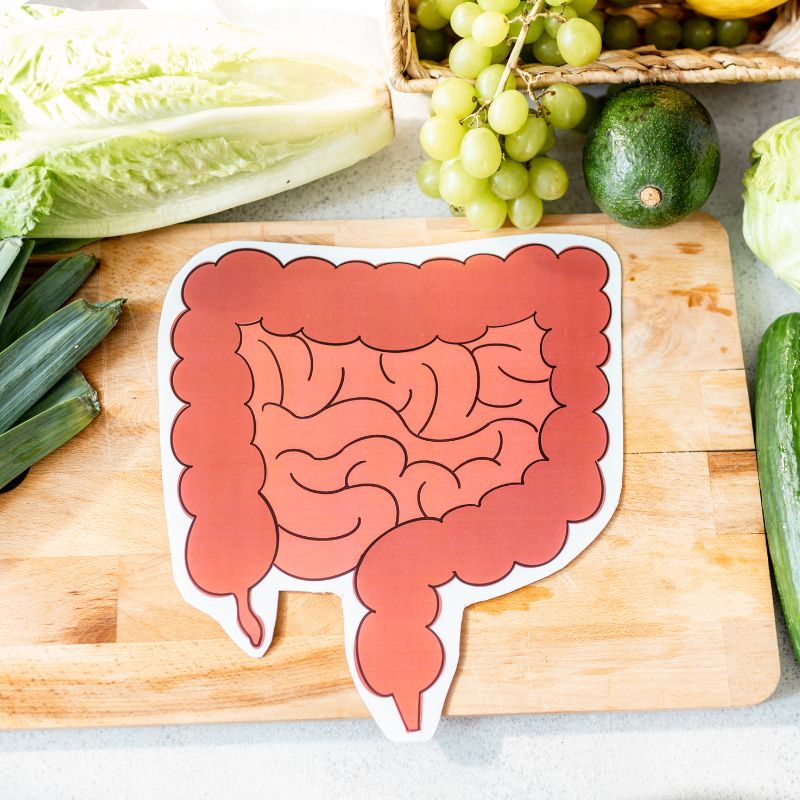
Tips for daily life with IBS
Tip 1
Schedule time for relaxation! If you are relaxed, so is your bowel! Stress increases the symptoms of IBS. Sufficient relaxation and regular exercise bring the intestines back into balance. Sauna, outdoor exercise and water treatments are useful. Training in relaxation methods (e.g. autogenic training, yoga) helps to control symptoms of stress, nervousness and anxiety. Patients with severe psychological problems and depression should consult a psychotherapist.
Tip 2
Eliminate flatulent, hard-to-digest foods from the diet. This requires making a food diary and finding out the foods, drinks and situations that influence the symptoms and cause discomfort. Prevention is better than cure. You should avoid the irritable bowel triggers! If dietary fibre that stimulate intestinal motility are given, water-soluble dietary fibre (locust bean gum, pectin) should be used. Many small portions are better than a few large ones! Eat slowly and chew well! Drink enough (e.g. non-carbonated mineral water)! Avoid fatty and flatulent foods as well as very cold and very hot drinks! Carbonated drinks and fruit also often cause discomfort.
Eat regularly and always at fixed times!
Tip 3
Smoking should be given up if possible and alcohol should only be consumed in moderation!
Tip 4
Taking a probiotic, specially developed multispecies synbiotics that protect the intestinal mucosa and balance the digestive function is ideal for the prophylaxis and supportive treatment of irritable bowel syndrome.

